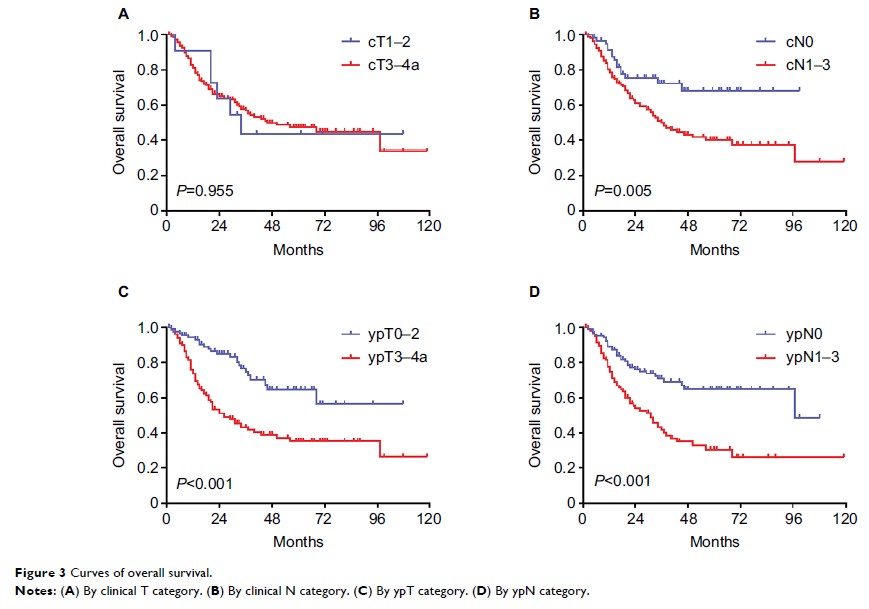108384
论文已发表
注册即可获取德孚的最新动态
IF 收录期刊
- 3.4 Breast Cancer (Dove Med Press)
- 3.2 Clin Epidemiol
- 2.6 Cancer Manag Res
- 2.9 Infect Drug Resist
- 3.7 Clin Interv Aging
- 5.1 Drug Des Dev Ther
- 3.1 Int J Chronic Obstr
- 6.6 Int J Nanomed
- 2.6 Int J Women's Health
- 2.9 Neuropsych Dis Treat
- 2.8 OncoTargets Ther
- 2.0 Patient Prefer Adher
- 2.2 Ther Clin Risk Manag
- 2.5 J Pain Res
- 3.0 Diabet Metab Synd Ob
- 3.2 Psychol Res Behav Ma
- 3.4 Nat Sci Sleep
- 1.8 Pharmgenomics Pers Med
- 2.0 Risk Manag Healthc Policy
- 4.1 J Inflamm Res
- 2.0 Int J Gen Med
- 3.4 J Hepatocell Carcinoma
- 3.0 J Asthma Allergy
- 2.2 Clin Cosmet Investig Dermatol
- 2.4 J Multidiscip Healthc

新辅助化疗后接受食管切除术的局部晚期食管鳞癌患者的长期生存率:一项队列研究
Authors Huang Z, Li S, Yang X, Lu F, Huang M, Zhang S, Xiong Y, Zhang P, Si J, Ma Y, Yang Y
Received 20 November 2018
Accepted for publication 15 January 2019
Published 8 February 2019 Volume 2019:11 Pages 1299—1308
DOI https://doi.org/10.2147/CMAR.S195355
Checked for plagiarism Yes
Review by Single-blind
Peer reviewers approved by Dr Cristina Weinberg
Peer reviewer comments 2
Editor who approved publication: Dr Antonella D'Anneo
Purpose: The role
of neoadjuvant chemotherapy and subsequent adjuvant therapy in the treatment of
patients with locally advanced esophageal squamous cell carcinomas (ESCC) is
not well established.
Patients and methods: We
retrospectively reviewed 228 patients with locally advanced ESCC receiving
esophagectomy following neoadjuvant chemotherapy from January 2007 through
December 2016. The probabilities of disease-free survival (DFS) and overall
survival (OS) were estimated by means of the Kaplan–Meier method and were
compared with the use of the log-rank test. Univariate and multivariate
analyses of predictors of DFS and OS were performed using a Cox
proportional-hazards model. Propensity score matching analysis was performed
for further analysis regarding the benefit of adjuvant therapy.
Results: The
pathological complete response of neoadjuvant chemotherapy was achieved in 13
of 228 patients (5.7%). With a median follow-up of 59.6 months, the median DFS
and OS were 35.4 and 45.4 months, respectively. The multivariate Cox model
determined chemotherapy regimens (P =0.003) and ypT category (P =0.006) were
significant independent predictors of DFS; and chemotherapy regimens (P =0.001), ypT
category (P <0.001),
and ypN category (P =0.013) were significant independent predictors of
OS. Furthermore, patients who received adjuvant therapy seemed to be associated
with poorer survival (both DFS and OS) compared with those who did not in full
cohort (P =0.001
and P =0.184,
respectively) and matched cohort (P =0.251 and P =0.374, respectively).
Conclusion: Surgery
following neoadjuvant chemotherapy was applicable. Chemotherapy regimens and
ypT category were significant independent predictors of both DFS and OS and ypN
category was also a significant independent predictor of OS. However, these
patients did not seem to benefit from subsequent adjuvant therapy. The
necessity of adjuvant therapy requires further investigation.
Keywords: locally
advanced esophageal squamous cell carcinoma, neoadjuvant chemotherapy, surgery,
adjuvant therapy
